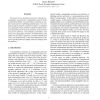216 search results - page 10 / 44 » Models and Proofs of Protocol Security: A Progress Report |
SP
2008
IEEE
13 years 5 months ago
2008
IEEE
e an abstraction of zero-knowledge protocols that is le to a fully mechanized analysis. The abstraction is formalized within the applied pi-calculus using a novel equational theor...
FSTTCS
2007
Springer
14 years 26 days ago
2007
Springer
Abstract. The abstraction of cryptographic operations by term algebras, called DolevYao models or symbolic cryptography, is essential in almost all tool-supported methods for provi...
CSFW
2007
IEEE
14 years 1 months ago
2007
IEEE
We present a new mechanized prover for showing correspondence assertions for cryptographic protocols in the computational model. Correspondence assertions are useful in particular...
EUROCRYPT
2007
Springer
13 years 10 months ago
2007
Springer
We show an efficient secure two-party protocol, based on Yao's construction, which provides security against malicious adversaries. Yao's original protocol is only secur...
SP
1998
IEEE
13 years 11 months ago
1998
IEEE
A strand is a sequence of events; it represents either the execution of legitimate party in a security protocol or else a sequence of actions by a penetrator. A strand space is a ...

